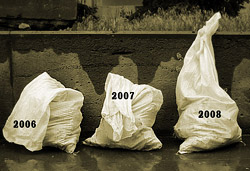The society discusses the upcoming presidential elections of 2008 differently; mostly they discuss the “legal” and “pragmatic” aspects. The “legal” point is discussed the following manner: will the president be elected by public vote or through electoral violations in 2008? As for the “pragmatic” point, it is the following: will Serj Sargsyan become president in 2008 or not? Of course, there is much time till the elections, however there aren’t any other competent candidates now.
Nevertheless, the president said in his recent speech that “the candidate that you think is the most possible candidate will not become president”. In other words, he spoke about the issue “pragmatically”. Otherwise he would say that the next president will be the one that will receive the most quantity of votes and he, being the president, would do his best to make sure that the elections are organized in fair, transparent and democratic conditions. By the way, everyone knows what journalists think about the mentioned “most possible candidate”, however it is not right to analyze the situation now since once they may ask, “whom did you mean, Mr. Beria?”.
In a word, we are going to have many surprises during the upcoming presidential elections. It is clear that the expectations will come true in 2007. Definitely it will be during the parliamentary elections. In spite of the mentioned ideas, the political processes in 2006 were fully predictable and there wasn’t anything surprising and unpredictable…
What did happen in 2006? Firstly, there were too many different processes in the inner politics. There were serious changes both in the oppositional and governmental branches. The governmental powers formed two great political parties, i.e. the Armenian Republican party was strengthened and the “Prosperous Armenia” party was founded. As for the Republican party, its capacities before the summit in July and after it were quite different. It is clear that the new political party mainly will compete with the “Prosperous Armenia” during the upcoming presidential elections. By the way, the “competition” we mean between these parties may not be strong, but may be slight competition like “the social competition” that different cities used to make between each other during the Soviet period. In fact, they may be in good relations and then pass the flag of the power to each other friendly. This is what made 2006 unique politically; they divided the governmental resources between two big political parties due to some tactical reasons.
The opposition was transformed too. The traditional opposition gave up and was alienated (“Justice” alliance, National Unity and others). Instead of that they initiated different political formats such as the Anti-criminal movement, civic disobedience, etc. As a rule, such organizations are weak in organizing and don’t have improved institutional capacity, but are straight and can act fast. By the way, one of the most interesting changes in politics in 2006 was the fact that there were many arrests for the purpose of stopping “active actions”.
Also, 2006 was unique with the fact that the “window of opportunities” of the Karabakh conflict was shut strongly. At the same time the mentioned window was shut for at least one and half years since they said that the process would be passive in pre-election periods and the issue should not be used for campaigning purposes.
Now let’s sum up. The conflict of Karabakh was not settled in 2006 and it is not clear yet whether it is good or not. Armenia became more alienated in the region because of the conflict between Georgia and Russia. The opposition was as passive as in 2005. The Armenian Dram was appreciated by more 25% (In December, 2005, 1 USD exchange rate was 480 AMD, and now it is 360 AMD), due to which the production capacity fell down. The real inflation grew too much, due to which Armenia was included in the list of the 20 most expensive cities of the world.
Notwithstanding, the French parliament adopted a law punishing those denying the fact of the Armenian Genocide. We should confess that it was a good reimbursement.

